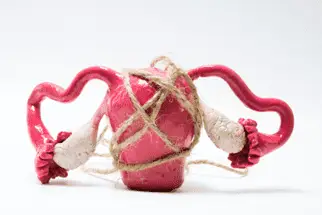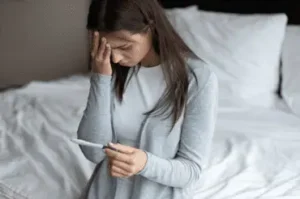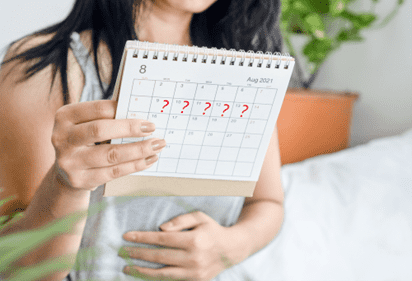Embarking on the journey of infertility treatments, such as IVF, comes with its share of highs and lows. When IVF doesn’t result in success, navigating the aftermath can be tough, especially when faced with irregular periods.
These irregular cycles not only bring emotional strain but also leave many wondering about the next steps.
We’re here to help make sense of irregular periods after IVF failure in a clear and supportive manner. Whether you’re going through this yourself or supporting someone who is, we aim to provide easy-to-understand insights and practical advice for moving forward with hope and resilience.
We at Nisha IVF, a trusted IVF centre in Ahmedabad, understand the emotional challenges of infertility treatments and the stress of a failed cycle. We offer compassionate support and expert guidance to help you overcome irregular periods post IVF failure, providing personalized care to help you move forward confidently.
Are you, or someone you know struggling with period irregularity after IVF failure? Visit a fertility specialist for your concerns.
Let’s uncover the mystery behind irregular periods and what might be causing them!!
What are Irregular Periods and Why Do They Occur?
Irregular periods mean your menstrual cycle doesn’t follow the usual pattern of around 28 days. This can happen for various reasons, like hormonal imbalances, stress, or certain health conditions.
Hormonal imbalances, like changes in estrogen and progesterone levels, can make your cycle irregular. Stress can mess with your hormones too. This affects when you get your period.
Your diet and exercise habits also play a role. Not eating enough or extreme weight loss can affect your hormones. Too much exercise or sudden changes in activity levels can disrupt your cycle.
Certain health conditions, such as PCOS or thyroid issues, can cause irregular periods too. These conditions mess with your hormone levels and can affect your menstrual cycle.
Having irregular periods might be temporary or could indicate a more serious issue. It’s essential to keep track of your menstrual cycle and talk to a doctor if you notice irregularities.
Take charge of your health and book an appointment today with an IVF specialist.
Curious about why your periods seem to be playing hide and seek after IVF? Let’s dig into the nitty-gritty and shed some light on why your cycle might be acting up post-treatment.
Understanding Irregular Periods Post-IVF
‘’Irregular periods post IVF failure can be a common occurrence. It affects around 30% of women. These irregularities can be due to various factors, such as hormonal changes, stress, or underlying health conditions,’’ says Dr.Nisarg Patel, an experienced IVF doctor in Ahmedabad.
He further states, ‘’It’s essential to track your menstrual cycle after an IVF failure and consult with your healthcare provider if you notice any significant changes or irregularities. They can provide guidance and support to help manage your menstrual health post-IVF.’’
Are you baffled by your body’s unpredictable antics post-IVF? Don’t worry, you’re not alone! Let’s unravel the possible reasons behind those!
Common Causes of Irregular Periods Post-IVF

1. Hormone levels: During IVF, the hormone levels can be imbalanced. Sometimes they need a bit of time to settle back into their normal levels, causing those irregular periods.
2. Stress: IVF is not easy, and associated stress can mess with your cycle.
3. Thyroid Troubles: Thyroid helps in regularizing your periods. If thyroid levels are imbalanced, it can cause problems.
4. PCOS: PCOS affects about 10% of women and can cause irregular periods.
So, if your periods are being a bit irregular post-IVF, don’t fret. Many have been there and conquered it. Consult your doctor to rule out any issues and get the support you need. Stay strong!!
Compassionate doctors not only treat but support you throughout the journey. Reach out to specialists to understand your condition.
Ready to take charge and get your cycle back on track?
Let’s explore the various treatment options available that can help in regularizing your cycles!!
Treatment
Treating irregular periods depends on what’s causing them. Often, simple lifestyle changes like staying active, eating healthy, and managing stress can help.
For hormonal imbalances, doctors might prescribe birth control pills or other hormone treatments. Sometimes, medications can help with conditions like PCOS. In serious cases, surgery might be an option.
Research shows that about 70% of women see improvements with lifestyle changes and treatments. But it’s important to talk to a doctor to find the best plan for you.
Explore your options with a trusted specialist!!
Struggling to keep your emotions in check amidst the chaos of irregular periods post-IVF?
Let’s dive into the rollercoaster of feelings and explore how to handle the ups and downs with grace and resilience.
The Emotional Impact of Irregular Periods After IVF Failure
 Experiencing irregular or no period after IVF failure can mess with your emotions. It can be very disappointing and uncertain.
Experiencing irregular or no period after IVF failure can mess with your emotions. It can be very disappointing and uncertain.
When your period doesn’t occur when expected, it’s natural to feel sad, frustrated, or even angry. It’s a constant reminder of the IVF not working out as planned.
You might find yourself questioning everything, wondering why it didn’t work and if there’s anything you could’ve done differently. It’s tough, and it can take a toll on your mental health and your relationships.
And it’s not just about the emotional stuff. Irregular periods can mess with your plans for future treatments, adding even more stress to an already stressful situation. The fear of going through another failed IVF can be overwhelming, making it hard to stay positive.
You’re not alone in this. It’s important to lean on your support system—whether it’s friends, family, or a therapist—who can help you through the tough times. And don’t forget to take care of yourself. Exercise, mindfulness, and getting enough sleep can make a big difference.
Taking care of your mental health is crucial during this time. If you need further guidance or support, consider reaching out to your nearest clinic for assistance!
Conclusion
The challenges of irregular periods after failed IVF can be emotionally draining. Understanding the causes and seeking support is crucial. Whatever the cause is, there are ways to manage and overcome it.
It is important to remember that you’re not alone. Connect with others who have gone through the same challenges and seek guidance from the specialists. Be proactive towards your health and seek timely professional advice to avoid consequences.
FAQs
Q1. How do I balance my hormones after IVF?
Balancing hormones after IVF can be supported through lifestyle changes. These include regular exercise, a balanced diet, stress management, and adequate sleep. Additionally, your doctor may recommend hormone therapy or supplements to help regulate hormone levels.
Q2. Do you ovulate after a failed IVF cycle?
Yes, ovulation can still occur after a failed IVF cycle, as the IVF process does not typically affect the regular ovulation cycle.
Q3. How long after a failed IVF cycle can I try again?
After a failed IVF cycle, it is typically recommended to wait for one to three months before trying again, to allow time for emotional healing and physical recovery.
Q4. How do you fix irregular periods?
Fixing irregular periods can involve lifestyle changes. Hormonal birth control or other medications may also be prescribed by a healthcare provider to regulate periods.


